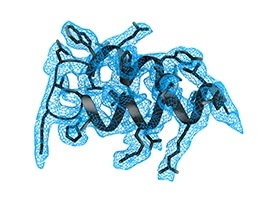A group of scientists from Ludwig-Maximilians-Universitaet (LMU) and Ulm University Hospital has established how SARS-CoV-2—the pandemic coronavirus—suppresses the production of proteins in infected cells and also demonstrated how this virus effectively disarms the innate immune system of the body.

Devastating effect: virus protein Nsp1 binds to the ribosome. Image Credit: Beckmann Laboratory.
While the name of this virus is comparatively unspecific and certainly obscure, the Nonstructural Protein 1 (Nsp1) encoded by the SARS-Cov-2 coronavirus, which has caused the present pandemic, has currently been demonstrated to have a detrimental impact on host cells.
Nsp1 is one of the fundamental arsenals employed by the virus to guarantee its own replication as well as propagation in human hosts. About two decades ago, the Nsp1 protein was established as a virulent factor after the outbreak of the associated SARS coronavirus when it was demonstrated to block the synthesis of proteins in infected cells.
Scientists from LMU in Munich and Ulm University Hospital have now discovered what makes the Nsp1 protein so powerful. The researchers have comprehensively described the mechanism of this protein in an article published in the Science journal.
In all biological cells, protein synthesis is carried out by complex molecular machines called ribosomes. Ribosomes communicate with messenger RNAs, or mRNAs, which act as blueprints in the synthesis of proteins, and convert the nucleotide sequence of every mRNA into the amino-acid sequence of the matching protein.
The sequence of amino acids consequently governs the biological function and shape of every individual protein. Ribosomes contain a pair of distinct subunits, and the Nsp1 protein adheres to the smaller one—that is, the 40S subunit.
Initially, the mRNA adheres to the smaller subunit, before the latter’s communication with the 60S subunit, to create the cavity by which the mRNA is subsequently threaded. The latest research demonstrates that one end of the Nsp1 protein communicates with the 40S subunit such that it inhibits the binding of the mRNA.
Professor Roland Beckmann and his collaborators from the LMU Gene Center used high-resolution cryo-electron microscopy and demonstrated in 3D detail how the Nsp1 protein adheres closely to a particular pocket found in the small ribosomal subunit and prevents the development of functional ribosomes.
Additional experiments showed that the Nsp1 protein can also communicate with particular configurational states of the ribosome that is fully assembled.
Moreover, the research team headed by Konstantin Sparrer from Ulm University Hospital successfully demonstrated that the shutdown of protein production results in an almost complete breakdown of one of the major lines of defense of the body against the virus.
The Nsp1 protein inhibits a crucial signaling cascade to inactivate the innate immune response. The study authors believe that the newly gained understanding will make it viable to look for means to neutralize the new coronavirus, and thus alleviate the severity of the respiratory disease caused by this virus.
According to the researchers, one potential method would be to design a molecule that conceals the binding site of the viral protein. This should be possible because the Nsp1-binding pocket itself does not seem to play a significant role in ribosomal function.
Source:
Journal reference:
Thoms, M., et al. (2020) Structural basis for translational shutdown and immune evasion by the Nsp1 protein of SARS-CoV-2. Science. doi.org/10.1126/science.abc8665.